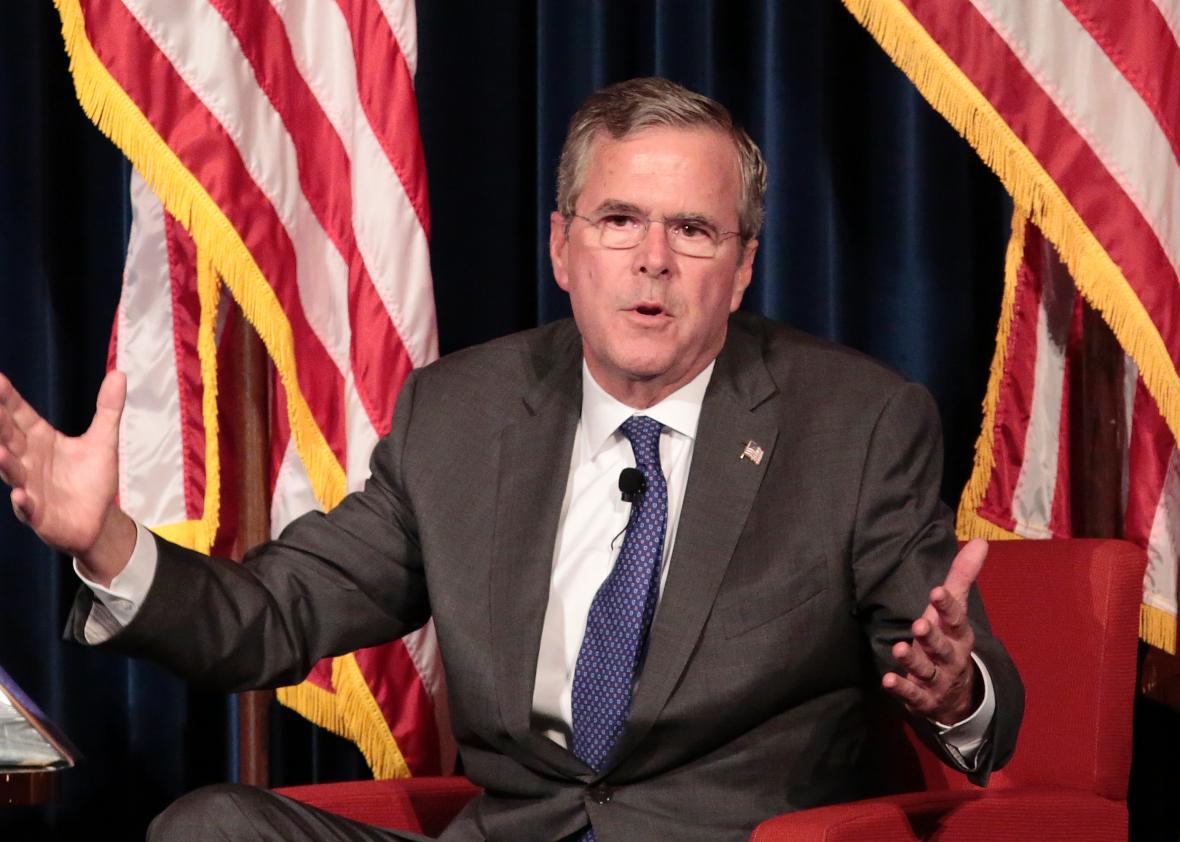When first developed by 48 states and the District of Columbia in 2009, the Common Core State Standards appeared to be an innocuous bipartisan effort between the National Governors Association and state school officials that set guidelines on what kids should learn and when they should learn it. The math and English standards differ from state to state and—though politicians are increasingly fond of claiming otherwise—don’t define curriculum, but rather a certain set of skills kids should master grade by grade. For the math standards, that means being able to “use addition and subtraction within 20” by first grade and to “find all factor pairs for a whole number in the range 1-100” by fourth. The other main category of standards, English Language Arts, focuses broadly on teaching kids more sophisticated reading-comprehension skills to prepare them for the “demands of college, career, and life.” School districts and teachers decide for themselves how to implement these standards. Yet Common Core didn’t stay innocuous for very long.
The Obama administration prioritized Common Core with its Race to the Top incentives, offering states that adopted the standards preference in their bid for extra money. While few Republican leaders objected to this initiative at the time, in recent years conservatives—even, or especially, the same ones who once supported the standards—have come to demonize Common Core as an egregious example of federal overreach. States and local school districts should be responsible for developing their own curriculum, this argument runs, not Washington. It’s yet another variation of the right’s tired “abolish the Department of Education” rhetoric, though particularly incoherent since Common Core has exactly no bearing on how curriculum is developed or implemented.
Democratic presidential contenders still for the most part support Common Core; in April, Hillary Clinton called the politics that have sprung up around the standards “really unfortunate” and “very painful, because the Common Core started off as a bipartisan effort—it was actually nonpartisan.” But on the Republican side, only two of the candidates still dare affirm the standards. And while a handful of others never liked Common Core, many clumsily withdrew their support when the political tides turned. Here’s where all the GOP candidates currently stand.
The Haters Who Always Hated
Some of the GOP contenders have been dead-set against the very notion of Common Core from the beginning, most notably former Texas Gov. and zombie candidate Rick Perry, who was so appalled by the potential takeover of Texas’ high educational standards that he refused even to compete for the Race to the Top funds tied to Common Core adoption. Under Perry, Texas was also one of only two states that refused to collaborate on the curriculum standards in the first place.

Photo by Chip Somodevilla/Getty Images
Another Texas politician, Sen. Ted Cruz, is almost as passionately opposed to Common Core as to Obamacare: “Instead of a federal government that seeks to dictate school curriculum through Common Core,” he said in his lofty announcement of candidacy at Liberty University in March, “imagine repealing every word of Common Core.” (Except—another Lone Star “oops”—you can’t actually repeal Common Core, because it’s not a law.)
Kentucky Sen. Rand Paul is another long shot who never dug Common Core much. In a January email to supporters (subject heading: “Rotten to the Core”) he blasted the standards, somewhat incomprehensibly, as being rife with “anti-American propaganda, revisionist history that ignores the faith of our Founders and data-tracking of students from kindergarten on.” Paul’s opposition to Common Core is certainly consistent with his less-is-more take on government, and he has repeatedly vowed to obliterate the Department of Education: “I don’t think you’d notice if the whole department was gone tomorrow,” he famously said last year.
And though Marco Rubio had previously shown support for higher standards, the Florida senator came out against Common Core relatively early, saying in 2013 that even if they started out “well-intentioned,” the standards now represent a bid “to turn the Department of Education into what is effectively a national school board.”
The 180-ers
This second group of Republican candidates supported Common Core when it was advantageous to do so but have since reversed their positions with varying degrees of hypocrisy. Take New Jersey Gov. Chris Christie, who, at a KIPP Charter School conference in August 2013, declared, in his typical balls-out way,
We’re doing Common Core in New Jersey and we’re going to continue. And this is one of those areas where I’ve agreed more with the president than not, and with Secretary [Arne] Duncan. … I think that part of the Republican opposition that you’ll see in some corners in Congress is a reaction—that knee-jerk reaction that’s happening in Washington right now—that if the president likes something, then the Republicans in Congress don’t and if the Republicans like something, then the president doesn’t. It is this mind-set in D.C. right now that says we have to be at war constantly. I just don’t buy that.
Sounds reasonable enough. Fast-forward a little less than two years and Christie is talking about Common Core like a broken-down Dodge Dart. “It’s now been five years since Common Core was adopted. And the truth is that it’s simply not working,” he said, and: “Instead of solving problems in our classrooms, it is creating new ones.” Even more emphatically, in June, Christie said, “We must reject federal control of our education and return it to parents and teachers. We need to take it out of the cubicles of Washington, D.C., where it was placed by the Obama administration and return it to the neighborhoods of New Jersey.”

Photo by Scott Olson/Getty Images
Louisiana Gov. Bobby Jindal also lands in the flip-flopper category. After showing initial support for Common Core—maintaining his enthusiasm for a full year after his enthusiastic prediction, in January 2012, that the standards “will raise expectations for every child”—Jindal did an about-face in 2014 and sued the federal government over an “attempt by the executive branch to implement national education reform far beyond the intentions of Congress.” (The Louisiana Board of Education sued the governor right back.)
Wisconsin Gov. Scott Walker, while he never displayed as much outright enthusiasm as his colleagues in New Jersey and Louisiana, by no means objected to the standards that were already in place when he took office as governor in 2011. His first budget recommended testing that would assess “mastery of Common Core Standards,” and Wisconsin became one of the first states to adopt Common Core. But by early 2014, Walker was “revisiting” the standards, and six months after that he made an even more dramatic reversal with a press release that “call[ed] on the members of the State Legislature to pass a bill in early January to repeal Common Core and replace it with standards set by people in Wisconsin.”
Former Arkansas Gov. Mike Huckabee, though he had already left office to professionally run for president by the time Common Core came on the scene, once supported the standards so vigorously that he wrote a letter to the Oklahoma state Legislature in 2013:
These standards, known as Common Core State Standards, have been near and dear to my heart since I served as Governor of your neighboring state of Arkansas. And it’s disturbing to me there have been criticisms of these standards directed by other conservatives including the RNC. The truth of the matter is, these criticisms are short-sighted.
After a growing backlash from his Tea Partier base, Huckabee repudiated the standards, colorfully observing, at the Iowa Freedom Summit in January 2015, “Folks, what Common Core may have originally been was a governor-controlled states initiative to keep the fickle federal fingers of fate off of education. It has morphed into a frankenstandard that nobody, including me, can support.” Huckabee’s campaign website drives the point home: “I also oppose Common Core and believe we should abolish the federal department of education. We must kill Common Core and restore common sense.”
The Late-to-the-Partiers
And then there are the Republicans who aren’t actually in charge of any body politic who had no reason to go on the record about Common Core back when politicians on both sides of the aisle actually thought uniform learning benchmarks weren’t a half-bad idea. Donald Trump, on the Hugh Hewitt Show in February, answered a question about Common Core by saying,
Trump: Well, first of all, I think it’s going to kill [Jeb] Bush, and I think that education should be local, absolutely. I think that for people in Washington to be setting curriculum and to be setting all sorts of standards for people living in Iowa and other places is ridiculous.
Hewitt: Why is it going to kill Bush?
Trump: Because I think people don’t want to have somebody from Washington looking down and saying this is what you’re going to be studying.
Hewitt: But do you think he’s responsible for that part of it?
Trump: No, but he’s responsible for supporting it.
In July, the Donald turned it up a notch, as he is wont to do, saying, “I think it’s pathetic what’s going on, [Bush’s] stance on Common Core. He’s in favor of Washington educating your children.”
Carly Fiorina offered a new (and I have to say not unintelligent) spin on Common Core opposition at the education summit in New Hampshire in August:
Common Core may have started out as a set of standards, but what it’s turned into is a program that honestly is being overly influenced by companies that have something to gain, testing companies and textbook companies, and it’s becoming a set of standards, not on what a kid has to learn but instead on how a teacher has to teach and how a student should learn, and that kind of standardization is always going to drive achievement down, not up.
The Kinda-Sorta Supporters
That leaves just two Republican candidates standing on Common Core, even if both increasingly shy away from using those two words in that order: Ohio Gov. John Kasich and former Florida Gov. Jeb Bush.
Kasich has called the right-wing opposition to Common Core “hysteria,” according to the Blaze.
When you study the issue, you separate the hysteria from the reality. … We have carried it out. We have higher standards. We want our kids to perform better and do better. … The standards are determined by our local school boards. There is total local control.
That same month, January 2015, Kasich elaborated on Fox News:
The Common Core was written by state education superintendents and local principals. In my state of Ohio, we want higher standards for our children, and those standards are set and the curriculum is set by local school boards. Barack Obama doesn’t set it, the state of Ohio doesn’t set it. It is local school boards driving better education, higher standards, created by local school boards. I’ve asked the Republican governors who have complained about this to tell me where I’m wrong, and guess what, silence.
Though in more recent months he has acknowledged that the subject has become “radioactive,” Kasich hasn’t backed down from his support. At the education summit last week, he said, “I’m not going to change my position because there’s four people in the front row yelling at me.”

Photo by Jonathan Alcorn/Getty Images
Jeb Bush was an even more vociferous supporter before Republicans came out against the standards. In 2013, he said,
These standards, the Common Core State Standards, are clear and straightforward. They will allow for more innovation in the classroom, less regulation, they’ll equip students to compete with their peers across the globe. Do not pull back. Please do not pull back from high, lofty standards.
This May, Bush remained steadfast in his support: “Because people have a different view of what Common Core is, am I supposed to back away from something that I know works?”
This is still pretty much Bush’s position, though he is now more likely to emphasize that these standards are locally derived than their content. In August, he said: “The term ‘Common Core’ is so darn poisonous, I don’t even know what it means. I’m for higher standards—state-created, locally implemented—where the federal government has no role in the creation of standards, content, or curriculum.”
Bush continues to drive this point home, decoupling the idea of high standards from the “poisonous” term to the greatest extent possible. At the summit in New Hampshire, he said, “If people don’t like Common Core, fine. Just make sure your standards are much higher than the ones you had before. We can’t keep dumbing down standards.”
But we can always keep dumbing down the way we talk about them.
